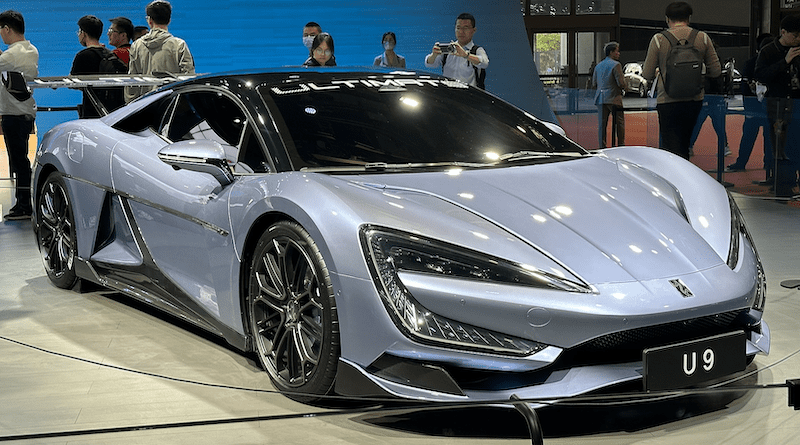BYD Announces Record Earnings: China’s EV ‘Godzilla’ Goes Into High Gear – Analysis
By RFA
By Chris Taylor
Automaker giant Mitsubishi’s final departure from China may have simply been the end of the road for a Japanese brand that has never performed well there, but it’s also a reminder of what an EV giant the country has become.
“China’s the world’s EV Godzilla, poised to smash everything in its path,” said auto-sector analyst Michael Dunne, in a stark warning to the world’s auto-making giants, Germany, the United States and Japan.
“China builds and buys more EVs than the rest of the world combined. They manufacture at costs that are 30% less than in the West. Who can compete with that?” asked Dunne.
The answer? Probably no one.
Take China’s No 1 EV maker BYD, which unveiled a record profit of US$1.42 billion on Monday – an achievement pulled off amid a price war that has forced Tesla, Ford, Hyundai, Volkswagen and others to repeatedly lower their prices.
As for the Japanese brands, which were disruptors themselves several decades ago, analysts do not consider them out of the ring yet – they’re just losing ground more slowly than brands in the U.S., and the European Union, where the auto sector accounts for 6.1% of employment.
“Japanese brands are losing share in China but not as rapidly as GM, Ford and the Koreans,” said Dunne. “All foreign mass market JVs [joint ventures] are down 30%-50% from their peaks of five years ago.
“Why? EVs now account for 33% of new car sales and the Chinese brands (plus Tesla) utterly dominate the EV market, winning on costs, improved designs and advanced tech features.”
The problem for the Japanese, according to a Chinese EV content creator who goes by the tag @ChinaDriven on X, formerly known as Twitter, is that the Japanese have struggled to compete, not only on price but in terms of producing compelling EV vehicles with features that catch the eyes of consumers.
“The problem with Mitsubishi,” @ChinaDriven told RFA is … Well, Mitsubishi.
“They’ve never had more than two EV brands on sale, and you just don’t see anyone driving them around.
But, @ChinaDriven added, that doesn’t mean that rival Japanese automakers like Nissan and Honda are going to quit on China completely.
“I don’t think they’re in the same position as Mitsubishi, which hasn’t been doing well in any kind of shape or form in China.
“But ultimately what it comes down to is that the Japanese don’t have offerings like extended-range EVs that are competitive. Even when they do have EV offerings it’s a very weak kind of play.”
Before the storm
As the MIT Technology Review recently put it, Chinese auto brands are for the first time on the brink of “beating foreign brands on their home turf” and even though Japan and the EU are reportedly in talks to ban subsidized vehicle imports, it’s possible that whatever agreement they come up with will be too little too late.
Between 2016 and 2022, the Chinese government is thought to have invested around US$57 billion in EV subsidies, AlixPartners, a U.S. management consulting firm, reported – and that is just in the form of support for tax breaks to encourage local consumers to drive green, leading China automakers to dominate their own domestic market.
Amid geopolitical uncertainty such as the Russian invasion of Ukraine, war in the Middle East and U.S.-China rivalry, foreign carmakers are now facing the challenge of competing not just on price but also on quality, as Chinese-manufactured vehicles dazzle more and more by the day.
BYD, which sells in Germany and Japan, among other markets, has seen its sales surge by 76% this year – its market value is more than Ford and GM combined.
Auto analyst Dunne is pessimistic about the chances of foreign automakers being able to fight back.
“In Europe the Chinese will find a way into most markets,” he said. “They’ll face little resistance in nations like Spain and the UK and the Netherlands, where there are no ‘home team’ car manufacturing industries.
“It’s already happening. SAIC [Motor] will sell more than 150,000 MGs in Europe this year, the majority of those in the UK.”
“Action by the EU to investigate subsidies will serve only to buy some time,” he said. “You saw that Stellantis just invested in Leapmotor and VW [Volkswagen] invested in Xpeng,” Dunne added, referring to foreign automakers investing into Chinese automakers to build vehicles in China and export them to Europe.
“Both companies see a future where they are manufacturing EVs in China for export globally, including back into Europe,” Dunne said.
“Speaking of the China manufacturing environment,” @ChinaDriven said, “Honestly I don’t fully know exactly what subsidies are across the country because there are national subsidies, local subsidies, as well as subsidies for different things like the subsidies for battery swapping and building out charge piles.”
The Japanese and the Europeans aren’t subsidizing on any such kinds of scale said @ChinaDriven, who added that the Chinese are subsidizing to such an extent that, “It has to be hurting all the competition.”
“They’re not competitive in the EV space,” he said … “And so what we’re seeing generally is car sales go down as EV sales are rocketing and they just don’t have those products on the market.
“Ok, the Germans do, but that’s because there’s always going to be people here [China] who want the status of a Mercedes or a BMW.”
But that’s not winning the EV race, the analyst said. “Your former Toyota buyer nowadays is more likely to dish out money on a cheaper Chinese vehicle with better features and a more premium feel.”

